Little El Salvador feels ache of separation from its dad or mum
[ad_1]
The individuals who stayed behind on this Salvadoran hill city, and people who fled to California’s San Joaquin Valley, consider one another with combined feelings.
Love and ache. Longing and envy. Gratitude and guilt.
Separated by 3,200 miles, Sensuntepeque, in central El Salvador, and the dusty farming neighborhood of Mendota, 35 miles west of Fresno, are joined as if by an umbilical wire of monetary want and emotional codependency.
Over the past three many years, Sensuntepeque, inhabitants 40,000, has despatched migrants — 1000’s of them — to america. The San Joaquin Valley has grow to be dwelling to so many Salvadorans that the federal government of El Salvador opened a brand new consulate in Fresno this month, including to these already in Los Angeles and San Francisco.
Most Salvadoran exiles had been determined to flee endemic poverty, failing farms and the lingering torments of a long-ago civil struggle. However the mass outflow left many damaged households in its wake.
“That they’re so distant, with out having the ability to see them, it’s a nightmare, and the household shouldn’t be full,” stated María Hilda Carballo, 53, whose two daughters left for the Central Valley years in the past.
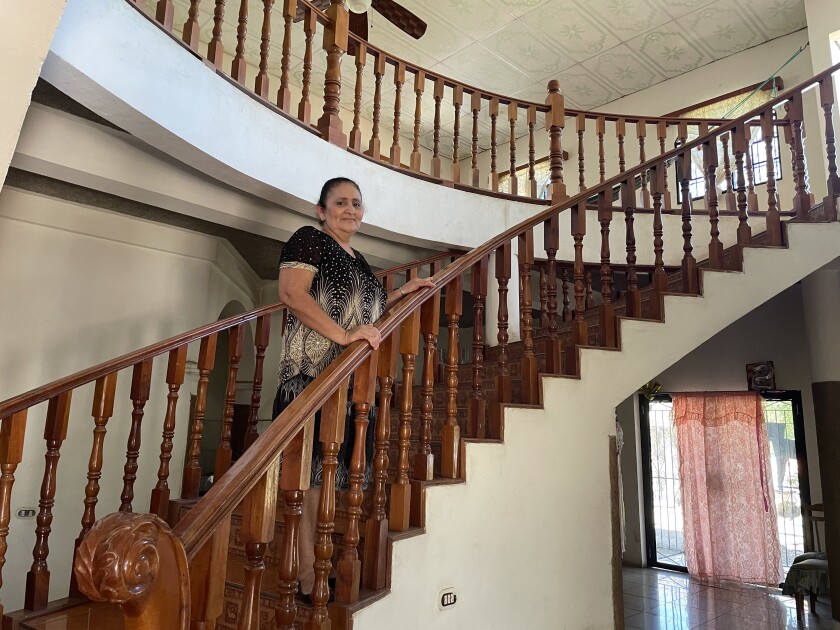
Maria Hilda Carballo lives in a home valued at simply over $300,000, within the municipality of Victoria, El Salvador. The home was constructed by her brother, Julio Carballo, a resident of Mendota, Calif.
(Soudi Jimenez / Los Angeles Instances)
In California’s farm belt, communities akin to Mendota, inhabitants 11,500, have come to depend on the sweat and muscle of Mexican and, more and more, Central American migrants to extract revenue from the land.
“It is a mini El Salvador,” stated Miguel Urías, a local of El Salvador and co-owner of Antojitos Guanacos, a restaurant and bakery chain, and considered one of many Mendota companies whose names sign their Salvadoran roots. “From six years in the past to now, I see that we’re arriving in droves.”
In return for the low-wage labor it receives, Mendota sends 1000’s of {dollars} in remittances again to Sensuntepeque and the encompassing departamento, or state, of Cabañas.
In 2020, regardless of the pandemic, El Salvador raked in nearly $6 billion in remittances from america, a rise from 2019 of 4.8%, based on the nation’s Central Reserve Financial institution. Cabañas in 2020 acquired a month-to-month common of $357 per family, second highest among the many nation’s 14 departamentos.
“The financial system, with out remittances, wouldn’t transfer,” stated Edgar Bonilla, who was mayor of Sensuntepeque from 2006 to 2021. Based on Bonilla, 75% of Sensuntepeque’s inhabitants has kinfolk in america, and a minimum of half of these obtain remittances from a California city many by no means will go to.
Cash wired from California has launched companies, purchased properties and stuffed them up with shopper items.
“They ship remittances to those individuals day-after-day, the banks are full day-after-day,” says Rosa Barrera, 46, who sells fruit, juices and snacks.
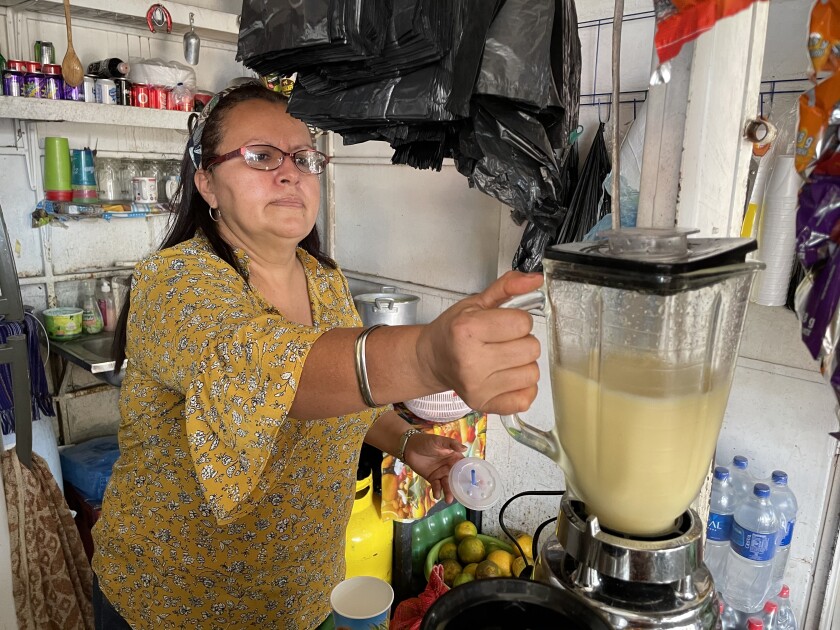
Rosa Barrera presents juices, fruits and snacks subsequent to the central park of Sensuntepeque, the place guests from overseas come to reconnect with their households.
(Soudi Jimenez / Los Angeles Instances)
In some ways, the connection between these kinfolk communities is mutually helpful and harmonious. However there are strains.
{Dollars} dispatched from California have turned this nook of El Salvador right into a business hub — it now boasts 10 banks and monetary cooperatives — but additionally made housing prices soar. Inequities are extra seen than in occasions previous.
Whereas extra properties in Sensuntepeque now sport flat-screen TVs and late-model automobiles of their driveways, the area’s roads stay cracked, its colleges underfunded, its medical clinics missing in provides.
The disruptions go deeper. Within the downtown space of Sensuntepeque, whose Indigenous identify means “400 hills,” some homes now value as much as $300,000, whereas numerous about 2,700 sq. ft goes for $10,000, stated Paul Nimrod Salgado, an actual property agent. These are princely sums in a nation the place the yearly per capita revenue is $4,000.
And whereas remittances soar in Sensuntepeque, in Mendota residents face a housing scarcity.
“It is vitally tough as a result of there are not any properties accessible,” stated Sindy Orellana, 19, a Salvadoran immigrant who’s in search of a home for her household and at the moment pays $1,000 to hire a two-bedroom condo.
The farmworkers and restaurant homeowners of Mendota take pleasure in having the ability to subsidize their far-flung kinfolk. However some additionally really feel the nagging burden of expectation, of getting to work lengthy hours whereas making an attempt to grasp a brand new language.
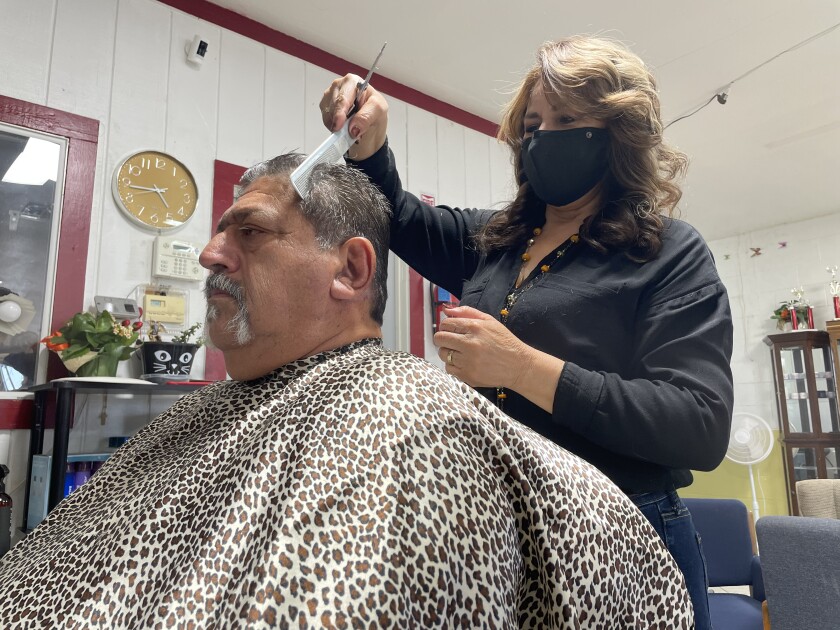
Like different Salvadoran immigrants, Emérita Barrera first labored in California’s tomato business. In 2008 she began her personal enterprise, Ally’s Magnificence Salon, positioned on seventh Road in Mendota.
(Soudi Jimenez / Los Angeles Instances)
“To really feel steady, you need to pay a really excessive worth,” stated Emérita Barrera, who immigrated to america in 1994.
::
The 12-year armed battle between the U.S-backed, right-wing Salvadoran authorities and leftist guerrillas supported by Cuba claimed 75,000 lives in a rustic of solely 4.5 million individuals at the moment.
Remittances despatched from Mendota have helped the Sensuntepeque space not solely get better however attain a way of life unimaginable earlier than the struggle.
Within the hamlet of San Pedro, rising out of a scrim of cornfields and dust streets, outdated mud huts give approach to showy concrete block homes. A sudden blast from a truck’s loudspeaker breaks the subdued environment.
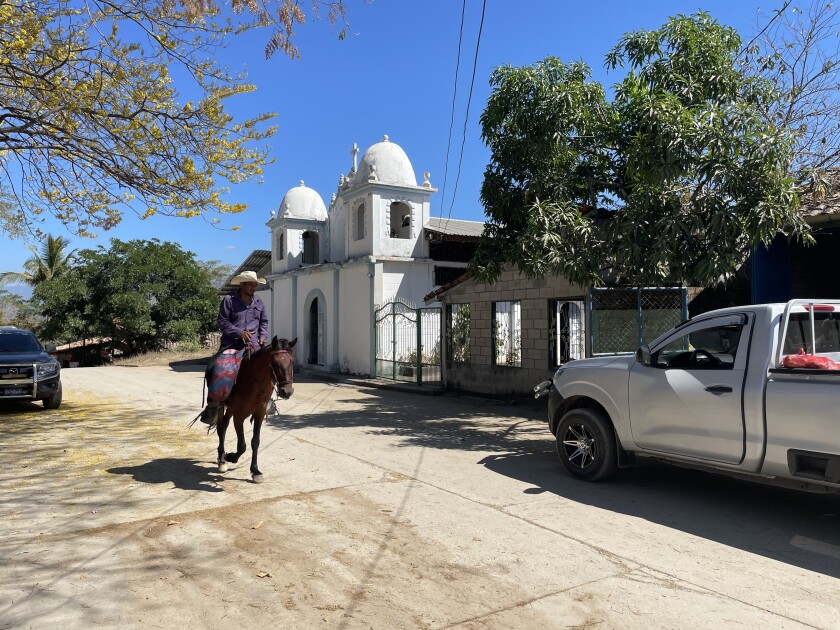
A rider on horseback traverses the dusty roads of San Pedro, El Salvador.
(Soudi Jimenez / Los Angeles Instances)
“We’ve potatoes, cabbages and carrots!” a tough male voice intones. The identical automobile is hawking chairs, mats, plastic jugs and different shopper items.
“The inhabitants right here have the most effective telephones and televisions,” says Miguel Amaya, 25, a Sensuntepeque resident who works as a driver, watching the road scene unfold. “Do you assume these homes are going to be owned by poor individuals?”
Down a slope, a number of paces previous a Catholic church, sits a two-story, four-room dwelling with nice wooden finishes and gilded columns. Its proprietor is María Hilda Carballo. One in every of her daughters, Maria Cindy, 29, immigrated to Mendota and one other, Griselda, 35, to Kerman. They’ve not been in a position to see their mom since they left dwelling a few years in the past.
Right this moment, the sisters labor in tomato and almond orchards to scrape collectively about $200 every month to ship Carballo.
“They each assist me with what little they make there,” she stated.
Carballo’s spacious home was paid for by her brother Julio, who additionally moved to Mendota. She lives with one other daughter and two teenage granddaughters. Beforehand, she lived in a home made from mud and items of wooden whereas elevating corn and making cheese to outlive.
In the identical hamlet, throughout a stream and up one other steep slope, María Gloria Reyes, 49, lives along with her husband, 5 kids and a grandson within the $40,000 dwelling paid for with assist from her sons, Emanuel, 27, and José, 32, who joined the exodus to Mendota within the early 2010s.
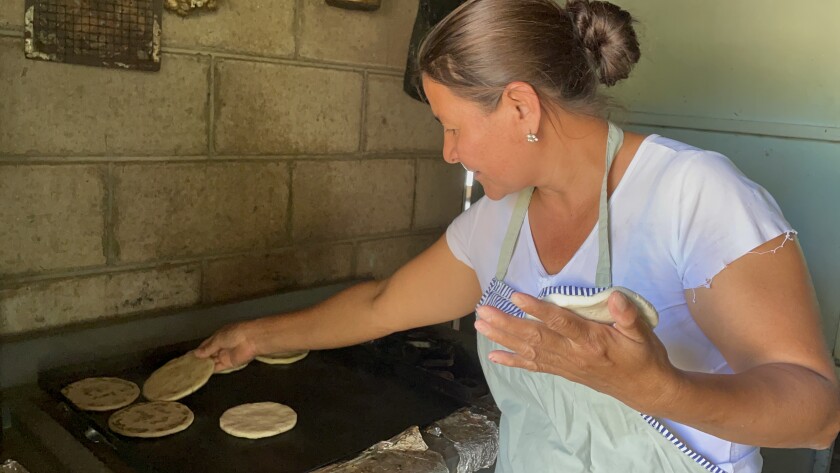
Corn tortillas are ready day-after-day by María Gloria Reyes for her whole household in Cabañas, El Salvador, whose help is dependent upon two kids who stay in Mendota.
(Soudi Jimenez / Los Angeles Instances)
“Seeing the poverty right here, they determined to go there,” Reyes stated as she tossed tortillas on a griddle.
Within the unsure weeks whereas her sons made the damaging trek, Reyes felt despair and a ache in her chest, questioning if she’d ever see them once more.
“You don’t know what can occur on the roads,” she stated.
Earlier than their new home was constructed, Reyes and her husband, Leandro Membreño, rented a hovel made from clay and galvanized steel sheets. Lately, Membreño has the posh of spending extra time stress-free in his hammock, however all over the place are reminders of a household aside.
“If you make a meal, you keep in mind them,” Reyes stated. The brothers’ favourite dish is the reminiscence of their mom’s hen soup.
::
I had the dream of doing one thing totally different. Many individuals come risking their lives. We Salvadorans are very robust at climbing our approach to get forward.
— Emérita Barrera
Canine bark on a darkish, chilly morning in Mendota. The clock says 5:30 a.m., however the parking zone of Sonora Market already has grow to be an anthill as vans cruise out and in disgorging farmworkers. They sprint into the shop and rapidly emerge clutching espresso cups and candy bread.
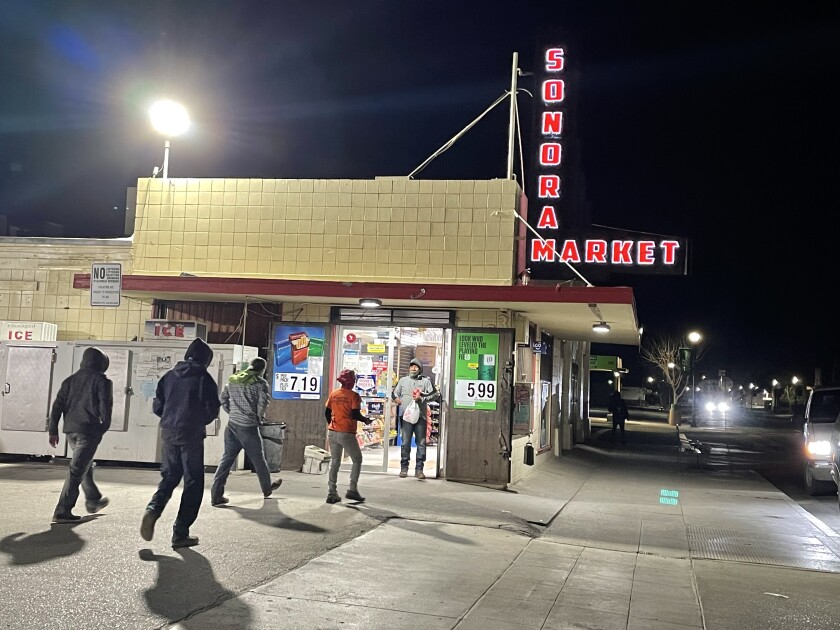
Farmworkers cease by Sonora Market earlier than sunup to purchase sizzling meals, water, sodas and ice for the arduous day forward.
(Soudi Jimenez / Los Angeles Instances)
It’s the each day routine in a neighborhood whose residents assist inventory the fridges and fill dining-room tables throughout America.
Abdul Obaid, a businessman from Yemen, stated that the city’s demographic map has fully modified within the 17 years since his household established the Sonora Market and its close by sibling, the Mendota Valley Meals grocery store, each liberally stocked with widespread Salvadoran fare.
“The Salvadoran inhabitants has quadrupled in a decade, and it’s as a result of individuals go the place they really feel at dwelling,” Obaid added.
Initially developed in 1891 as a storage web site for the Southern Pacific Railroad, Mendota was integrated in 1942 and its prosperity hinges on the manufacturing of almonds, pistachios, melons, tomatoes and corn. In 2019 the county’s farmworkers yielded $1.5 billion in almonds, $962 million in grapes and $660 million in pistachios.
When María Hilda Carballo’s brother, Julio Carballo, left El Salvador in 1994, he was 14 years outdated. Figuring out that he may get work in Mendota harvesting melons and asparagus, he determined to go stay with an uncle there.
It’s exhausting work, stated Carballo, 42. “You need to go to work very early,” he stated, “the chilly could be very heavy.”

Julio Carballo arrived in Mendota in 1994. After 5 years choosing melons and asparagus, he turned a truck driver and now owns a fleet of 25 vans.
(Soudi Jimenez / Los Angeles Instances)
He spent about 5 years within the fields earlier than he received a enterprise license and have become a truck driver. In 2004 he took out a mortgage of $40,000 to purchase his personal automobile and began his firm, JCC Transport Inc. Right this moment he owns 25 vans and is in command of greater than 40 workers.
Now that his entrepreneurial drive has paid off, and his immigration standing is roofed by the federal Non permanent Protected Standing program, he stated, “I can retire tomorrow.”
Luis Fernando Macías, professor of migration research at Fresno State, stated that the work previously executed by Mexicans in Mendota is now principally carried out by Salvadorans. Within the early years of Salvadoran migration, that typically gave rise to tensions.
“Once I got here, it was a bit sophisticated. The Mexican individuals seemed down on you. There was all the time discrimination whenever you went to work,” stated Tulio Vargas, 52, a Sensuntepeque native who arrived in Mendota in 1980.
Waves of Salvadoran immigrants have enlivened Mendota’s style buds, serving pupusas, torrejas, mataniños bread and garrobo soup, named for its major ingredient, an endangered black spiny-tailed iguana.
“Now, it’s a neighborhood solely of Sensuntepeque, purely the division of Cabañas,” stated Carmen Chévez, 69, who left El Salvador within the Nineties.
Emérita Barrera arrived in Mendota due to a everlasting residence request made by her husband. Although she’d studied cosmetology, she, too, began out in her adopted nation working within the tomato fields.
After 10 years, she took a hiatus to acquire her GED, turned a naturalized citizen, took courses at a Fresno magnificence faculty together with some enterprise administration programs, and finally opened her personal salon.
“I had the dream of doing one thing totally different,” she stated. “Many individuals come risking their lives. We Salvadorans are very robust at climbing our approach to get forward.”
The trauma of abandoning her mother and father and 6 siblings nonetheless haunts her. Her mother and father died in 2013, whereas Barrera was exterior her native nation. She final visited El Salvador in 2018.
Regardless of carving out higher lives economically, Mendota’s Salvadorans face huge challenges.
Based on the Census Bureau, 40.9% of Mendota’s inhabitants lives in poverty. In 2019 the common revenue per family was $31,237. An estimated 40% to 60% of the inhabitants is undocumented.
Within the 2015-2019 interval, the highschool commencement fee was 30.8%, and only one.5% of Mendota’s inhabitants obtained a bachelor’s or different school graduate diploma.
These statistics don’t replicate the story of Jessenia Núñez, who will quickly have the ability to show her legislation diploma.
The daughter of migrant farmworkers from Sensuntepeque, Núñez was born in 1992 in Riverside County. When she was in second grade, her household settled in Mendota and pushed her to go to varsity — first UC San Diego, the place she earned a political science diploma, then UC Berkeley College of Legislation.
“I owe lots to Mendota, to my mother and father, to my whole household who’ve all the time supported me,” she stated. “I watched my mother and father battle. They taught me to persevere.”
::
Throughout the miles, the California farm city and the Salvadoran hill city nonetheless dream of one another. Tulio Vargas, nonetheless remembers the day he left Sensuntepeque, as an 8-year-old together with his mom and two brothers.
“We went out at daybreak,” he recalled. “We didn’t wish to inform anybody.”
The Salvadoran navy authorities and its ruthless state safety equipment had been disappearing and killing anybody they suspected of sympathizing with the riot. Vargas stated safety forces had been concerned in killing his father and a fellow businessman. Fearing reprisals, the household fled.
Column One
A showcase for compelling storytelling from the Los Angeles Instances.
“We virtually left the home deserted,” he stated.
The household initially settled in Belize, however two years later, at age 10, Vargas and a pal moved on to Mendota. Over the many years, he rose to grow to be a farm administrator and, like so many others, despatched remittances to his homeland.
Again within the Los Remedios neighborhood of Sensuntepeque, an uncle has managed to carry on to the home the place Vargas and his household as soon as lived. Vargas now visits his hometown a couple of times yearly, although Mendota is dwelling too.
“The reality,” he stated, “is that El Salvador is one’s land, no matter it might be.”

